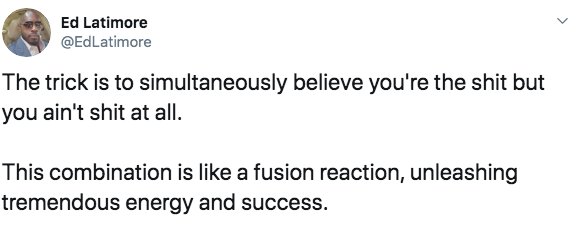
Do you know how to think?
How often do you spend time actually thinking?
Do you spend time analyzing not only your thoughts but the way you process them?
Most people spend the vast majority of their time doing absolutely no thinking at all. You think you think a lot, but really, your mind is just filled up with mental chatter.
Most of your problems in life come from your inability to think properly. You spend too much time reacting instead of being conscious of your thoughts and behavior in the moment.
I’m no expert in the art of thinking, and that’s the point.
The more you develop the ability to think, the less you believe in the idea of expertise at all. You constantly look to evolve.
The goal? There is no goal.
That’s why it’s so fun. Good thinkers have enough curiosity, skepticism, and hunger for information to keep them occupied for a lifetime.
Let’s look at some of the best ways to level up your thinking.
The Yin and Yang of the Mind
The ability to hold contradictory thoughts in your mind at the same time is a superpower. In life, you have to realize most of the important concepts you’ll learn to have a bit of a paradoxical nature to them.
Here’s an example from Twitter that sparked the idea for this entire post:

In an article about developing confidence, I talked about the idea that you have to simultaneously truly work hard and care about the outcomes you get in life while also…not caring about the outcomes at all. You put all the intention in the world into success but let go of the need for results.
What do many of the most intriguing people in the world have in common? They’re a walking contradiction. You can’t quite figure them out, pin them down, or pigeonhole them. Take someone like Tupac Shakur who bounced back and forth between a poetic prophet humanitarian to a ruthless gangster.
Most people think in a binary way. They can’t understand where conflicting arguments overlap. Don’t be this person.
Embrace ambiguity.
Understand You Have Two Minds
I’ve been meditating for years. Meditation isn’t about suppressing your thoughts. It’s about observing the nature of them.
Meditating often taught me how untrustworthy most of my thoughts were — doubts, snap judgments, emotional reactions, chatter.
This didn’t cure me from having negative thought patterns or emotions, but it gave me the ability to step outside of myself when they occurred.
When you learn to observe your thoughts, use one mind to observe the other, you can catch yourself and ask yourself:
- What is this thought, really? Where is it coming from?
- What’s underneath this thought, feeling, or emotion? What’s the real thought, feeling or emotion?
- Am I just full of shit right now?
The last question is the most useful one.
If you can get in the habit of deciphering whether or not you’re full of shit, you can learn to ground yourself more.
The more you analyze and observe your thoughts, you start to weigh them based on whether or not they’re useful to you. Some thoughts can be true, but not useful. Some thoughts can be irrational, but useful.
For example, it might be technically true that you have low odds at achieving something, but if you really want it, it’s not useful to think about how low the odds are. It might be irrational to believe you’ll pull it off, but it’s useful to believe it.
I try to use my delusion to my advantage where I can, and ruthlessly cut out the negative aspects of my imagination at the same tie. This can all be done without having truly unrealistic expectations.
Gamble With Your Life
It’s not smart to have wildly unrealistic expectations about everything all the time.
But, you do want to take stabs at outcomes with potentially low odds of success, at times. At other times, you want to be more practical and realistic.
You have to learn how to navigate life like a savvy gambler. This is hard to do.
I read a blog post by Ray Dalio where he talked about why being successful in the stock market is so difficult. It’s like a horse race. The sure bet to win the race has better odds, but the payout if you pick the horse to win is low The long-shot horse has low odds but the payoff is very high. The way the odds are set up, all bets have the same sort of value in a way.
Life is like this. If you want to be an accountant, there’s a surefire path to it, but there’s a ceiling on how successful you can become. Starting an online business has lower odds of success, but the upside is tremendous, infinite even.
The proper way to think about all of this — take opportunistic swings at routes with high upside, but protect your downside, too.
Most online business models aren’t costly to start now. You won’t go bankrupt if you try. But you can “waste time” if it doesn’t work out exactly the way you want it to.
Alternate between making bets with high upside and safe bets with ceilings.
Abandon This View of Yourself Altogether
The more rational and certain you think you are, the more irrational and delusional you probably are.
Ironically, it’s easier to fool and persuade intelligent people because they’re so good at creating “post hoc” reasons for emotional decisions they make that they do an even better job of irrationally convincing themselves of their own rationality.
“Ok big word guy, what the hell are you talking about?”
Confirmation bias.
You believe what you want to believe, first. You make up the reasons second.
The easiest example is politics. Usually, once someone “leans” a certain way and digs their heels in, it’s hard to sway them in the other direction at all. And both sides are certain they’re right.
Your mind will twist information however it sees fit. Try to read an article with an opposing viewpoint — you might skip over parts of the article subconsciously…you literally won’t read the convincing parts of the argument and your brain will highlight and emphasize the areas you can poke holes in.
The point of this section is to simply be aware of how strong your own confirmation bias is. It’s not even a “solvable” problem, really.
I like to say I’m open-minded, but I don’t really know if I am. If anything, I’m trying to reduce my own confirmation bias and increase my critical thinking by a few basis points. That’s probably the best you and I can hope for.
K.I.S.S.
My political science teacher gave us one assignment per week.
We’d have a topic to research and be prepared to discuss. Each week, we were assigned to write a one-page essay about the topic. We could not exceed one page, either.
He said if we couldn’t explain our thinking in one page, we didn’t know what we were talking about. Charlatans make the simple sound complex and good thinkers make the complex sound simple.
Develop the skills of summing things up.
Tie a throughline through your thoughts and ideas when explaining them. This post explains how good thinking comes from being constantly skeptical of your own thoughts.
Use simple language. When you try to use big words and talk over people’s heads, it shows you really know what you’re talking about. You can see this in academia. Many academics and entire academic fields are totally fraudulent.
A quick way to tell if you’re reading garbage — look for word salads. Word salads are long complex sentences that don’t actually mean anything.
Many people like my writing because I get to the point. I love big words and sprinkle them in naturally, but I’m not trying to write pretty. I’m trying to get the concepts across.
Speaking of.
The Pen is Mightier Than the Sword
If you think you know something, write about it. Writing shows you whether or not you understand something. Writing well helps you think well.
Often, I solve many of my own problems while writing about the problems themselves. I get to help other people and exercise my brain at the same time.
If you know how to write, you can rule the world.
I get requests for writing jobs, marketing jobs, and all other sorts of opportunities. People reach out to me because they think I’m smart and potentially useful to them.
Writing demonstrates my abilities.
Penelope Trunk, a blogging grandmaster wizard, says blogging is key to career success. She’s right. Even if you don’t want to become a writer, publishing your expertise with words online can help your career.
Write blog posts, write Tweets, write updates on other social media platforms. Use writing to display your thinking to the world. Do it well, and the world will respond positively.
Don’t be a Booksmart Idiot
“Mathematicians think in symbols, physicists in objects, philosophers in concepts, geometers in images, jurists in constructs, logicians in operators, writers in impressions, and idiots in words.” – Nassim Taleb
What does Taleb mean here when he says “Idiots think in words.”
He means that idiots get tied up in literal definitions of words. In an article called We Don’t Know What We’re Talking About When We’re Talking About Religion, he talks about how religion has many different meanings depending on the religion you’re talking about.
Also, he points out that certain evil political regimes label themselves religions and get protection because religion is a protected cure-all type of word.
Good writers don’t think in words. They use words to get ideas across.
Usually, those who try to label and categorize too much don’t know how to think. They use words as weapons to defeat their opponents, e.g., calling anyone you disagree with a “Nazi” or a “Liberal snowflake.”
If we all debated using, you know, actual ideas and concepts, there’d be more nuance in these debates. Alas, this is not how things work at all. You see nothing but words flung back and forth. Lazy.
The Bottom Line
I could keep going here. There are many different mental models and concepts to adopt.
I think you get the point by now.
To become a better thinker, don’t become a slave to your “fast brain,” that makes snap judgments, relies on confirmation bias, and filters everything to fit your worldview instantly.
Slow down. Consciously process information. Try to decipher whether or not you’re full of shit.
Wash, rinse, repeat.